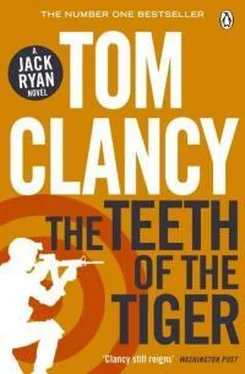“Salaam aleikum,” his killer said: Peace be unto you. So, this was an Arab? He didn’t look the least bit Arabic. The puzzlement must have been evident on his face.
“Did you really trust Hassan, Jew?” the man asked. But he displayed no satisfaction in his voice. The emotionless delivery proclaimed contempt. In his last moments of life, before his brain died from lack of oxygen, David Greengold realized that he’d fallen for the oldest of espionage traps, the False Flag. Hassan had given him information so as to be able to identify him, to draw him out. Such a stupid way to die. There was time left for only one more thought:
Adonai echad.
The killer made sure his hands were clean, and checked his clothing. But knife thrusts like this one didn’t cause much in the way of bleeding. He pocketed the wallet, and the dead-drop package, and after adjusting his clothing made his way out. He stopped at his table to leave twenty-three Euros for his own meal, including only a few cents for the tip. But he would not be coming back soon. Finished with Giovanni’s, he walked across the square. He’d noticed a Brioni’s on his way in, and he felt the need for a new suit.
HEADQUARTERS,United States Marine Corps, is not located in the Pentagon. The largest office building in the world has room for the Army, Navy, and Air Force, but somehow or other the Marines got left out, and have to satisfy themselves with their own building complex called the Navy Annex, a quarter of a mile away on Lee Highway in Arlington, Virginia. It isn’t that much of a sacrifice. The Marines have always been something of a stepchild of the American military, technically a subordinate part of the Navy, where their original utility was to be the Navy’s private army, thus precluding the need to embark soldiers on warships, since the Army and the Navy were never supposed to be friendly.
Over time, the Marine Corps became a rationale unto itself, for more than a century the only American land fighting force that foreigners ever saw. Absolved of the need to worry about heavy logistics, or even medical personnel – they had the squids to handle that for them – every Marine was a rifleman, and a forbidding, sobering sight to anyone who did not have a warm spot in his heart for the United States of America. For this reason, the Marines are respected, but not always beloved, among their colleagues in America’s service. Too much show, too much swagger, and too highly developed a sense of public relations for the more staid services.
The Marine Corps acts like its own little army, of course – it even has its own air force, small, but possessed of sharp fangs – and that now included a chief of intelligence, though some uniformed personnel regarded that as a contradiction in terms. The Marine intelligence headquarters was a new establishment, part of the Green Machine’s effort to catch up with the rest of the services. Called the M-2 – “2” being the numerical identifier of someone in the information business – the chief’s name was Major General Terry Broughton, a short, compact professional infantryman who’d been stuck with this job in order to bring a little reality to the spook trade: The Corps had decided to remember that at the end of the paper trail was a man with a rifle who needed good information in order to stay alive. It was just one more secret of the Corps that the native intelligence of its personnel was second to none – even to the computer wizards of the Air Force whose attitude was that anyone able to fly an airplane just had to be smarter than anybody else. Eleven months from now, Broughton was in line to take command of the Second Marine Division, based at Camp Lejeune, North Carolina. This welcome news had just arrived a week before, and he was still in the best of good moods from it.
That was good news for Captain Brian Caruso as well, for whom an audience with a general officer was, if not exactly frightening, certainly reason for a little circumspection. He was wearing his Class-A olive-colored uniform, complete to the Sam Browne belt, and all the ribbons to which he was entitled, which wasn’t all that many, though some of them were kind of pretty, as well as his gold parachute-jumper’s wings, and a collection of marksmanship awards large enough to impress even a lifelong rifleman like General Broughton.
The M-2 rated a lieutenant-colonel office boy, plus a black female gunnery sergeant as a personal secretary. It all struck the young captain as odd, but nobody had ever accused the Corps of logic, Caruso reminded himself. As they liked to say: two hundred thirty years of tradition untrammeled by progress.
“The General will see you now, Captain,” she said, looking up from the phone on her desk.
“Thank you, Gunny,” Caruso said, coming to his feet and heading for the door, which the sergeant held open for him.
Broughton was exactly what Caruso had expected. A whisker under six feet, he had the sort of chest that might turn away a high-speed bullet. His hair was a tiny bit more than stubble. As with most Marines, a bad hair day was what happened when it got to half an inch, and required a trip to the barber. The general looked up from his paperwork and looked his visitor up and down with cold hazel eyes.
Caruso did not salute. Like naval officers, Marines do not salute unless under arms or “covered” with a uniform cap. The visual inspection lasted about three seconds, which only felt like a week or so.
“Good morning, sir.”
“Have a seat, Captain.” The general pointed to a leather-covered chair.
Caruso did sit down, but remained at the position of attention, bent legs and all.
“Know why you’re here?” Broughton asked.
“No, sir, they didn’t tell me that.”
“How do you like Force Recon?”
“I like it just fine, sir,” Caruso replied. “I think I have the best NCOs in the whole Corps, and the work keeps me interested.”
“You did a nice job in Afghanistan, says here.” Broughton held up a folder with red-and-white-striped tape on the edges. That denoted top-secret material. But special-operations work often fell into that category, and, sure as hell, Caruso’s Afghanistan job had not been something for the NBC Nightly News.
“It was fairly exciting, sir.”
“Good work, says here, getting all your men out alive.”
“General, that’s mostly because of that SEAL corpsman with us. Corporal Ward got shot up pretty bad, but Petty Officer Randall saved his life, and that’s for sure. I put him in for a decoration. Hope he gets it.”
“He will,” Broughton assured him. “And so will you.”
“Sir, I just did my job,” Caruso protested. “My men did all–”
“And that’s the sign of a good young officer,” the M-2 cut him off. “I read your account of the action, and I read Gunny Sullivan’s, too. He says you did just fine for a young officer in his first combat action.” Gunnery Sergeant Joe Sullivan had smelled the smoke before, in Lebanon and Kuwait, and a few other places that had never made the TV news. “Sullivan worked for me once,” Broughton informed his guest. “He’s due for promotion.”
Caruso bobbed his head. “Yes, sir. He’s sure enough ready for a step up in the world.”
“I’ve seen your fit-rep on him.” The M-2 tapped another folder, this one not with TS formatting. “Your treatment of your men is generous in its praise, Captain. Why?”
That made Caruso blink. “Sir, they did very well. I could not have expected more under any circumstances. I’ll take that bunch of Marines up against anybody in the world. Even the new kids can all make sergeant someday, and two of them have ‘gunny’ written all over them. They work hard, and they’re smart enough that they start doing the right thing before I have to tell them. At least one of them is officer material. Sir, those are my people, and I am damned lucky to have them.”
Читать дальше









